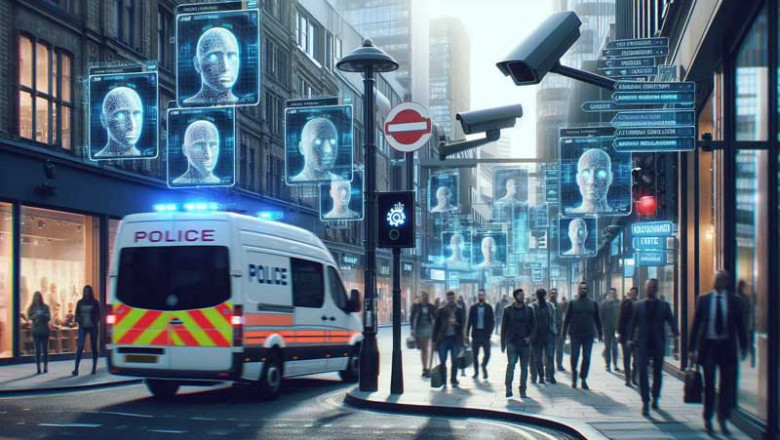
views
The UK has significantly increased the use of facial recognition technology, artificial intelligence (AI), and internet regulation as part of its efforts to tackle crime and public safety issues. This has triggered concerns about the extension of surveillance and its impact on privacy and civil liberties.
Expanded Use of Facial Recognition and AI in Policing
Since 2015, all police forces across the UK have adopted facial recognition technology, with many using live facial recognition systems that scan crowds in real time to match faces against watchlists. The Metropolitan Police in London is set to install the UK's first permanent facial recognition cameras in Croydon and has doubled its weekly live facial recognition deployments, scanning tens of thousands of faces regularly. Other police forces are trialing operator-initiated facial recognition via officers' phones for instant identification during interactions. This technology has reportedly led to hundreds of arrests including registered sex offenders.
While intended to prevent and solve crimes such as violent offenses and sexual crimes, the technology operates in a legal gray area with a fragmented regulatory framework that lacks clear rules and oversight. Advocacy groups warn it enables intrusive mass surveillance, and there are documented concerns about inaccuracies, including racial bias in facial recognition performance.
Intensifying Internet Regulation Under the Online Safety Act
The UK’s Online Safety Act, effective since late 2023 and being implemented in phases, imposes stringent obligations on online platforms to manage illegal and harmful content, particularly protecting children from harmful online material. Platforms face hefty fines and potential criminal liabilities for non-compliance. The Act empowers Ofcom, the telecom regulator, to block access to certain websites and impose duties on services considered high risk.
While supporters argue these measures are crucial for child protection and combating illegal online harms, detractors emphasize the risks posed to privacy, freedom of expression, and the potential for overreach in content moderation and data access demands.
Concerns About Surveillance Overreach and Legal Uncertainty
Human rights groups and independent research bodies highlight that the rapid expansion of biometric surveillance, including facial recognition in public and private sectors such as shops and schools, lacks a coherent legal basis or adequate safeguards. The current approach is described as fragmented and piecemeal, creating legal uncertainty and undermining public trust. Calls for new, risk-based legislation and an independent regulator to oversee biometric and AI surveillance technologies are growing.
The government acknowledges the value of AI and facial recognition technologies in national security and crime prevention but faces ongoing criticism for insufficient transparency, accountability, and protections against misuse, bias, or errors.
This overview reflects the UK’s current trajectory in deploying advanced surveillance technologies and tightening internet regulations, alongside the rising debate about striking a balance between enhancing public safety and preserving democratic freedoms and privacy rights.libertyhumanrights+8
- https://www.libertyhumanrights.org.uk/fundamental/facial-recognition/
- https://techpolicy.press/ai-facial-recognition-surveillance-in-the-uk
- https://www.mayerbrown.com/en/insights/publications/2025/08/the-online-safety-act-enters-phase-2
- https://www.adalovelaceinstitute.org/press-release/mass-facial-recognition-roll-out-exists-in-legal-grey-area/
- https://en.wikipedia.org/wiki/Online_Safety_Act_2023
- https://www.bbc.com/news/articles/cj4wy21dwkwo
- https://www.nytimes.com/2025/09/17/technology/britain-facial-recognition-digital-controls.html
- https://www.gov.uk/government/news/live-facial-recognition-technology-to-catch-high-harm-offenders
- https://www.hunton.com/privacy-and-information-security-law/uk-ico-considers-application-of-data-protection-law-to-live-facial-recognition-technology
- https://www.gov.uk/government/news/tackling-ai-security-risks-to-unleash-growth-and-deliver-plan-for-change
- https://actuate.ai/security-resources/ai-video-surveillance-how-far-is-too-far-for-public-safety/
- https://www.gov.uk/government/collections/online-safety-act
- http://www.privacyinternational.org/news-analysis/5635/revealed-skyrocketing-scale-uk-polices-secret-facial-recognition-searches
- https://www.qmul.ac.uk/research/featured-research/ai-in-surveillance-how-do-we-avoid-a-dystopia/
- https://www.gov.uk/government/publications/online-safety-act-explainer/online-safety-act-explainer
- https://www.ncsc.gov.uk/guidance/ai-and-cyber-security-what-you-need-to-know
- https://www.whitecase.com/insight-alert/uk-online-safety-act-protection-children-codes-come-force
- https://ico.org.uk/for-organisations/uk-gdpr-guidance-and-resources/artificial-intelligence/guidance-on-ai-and-data-protection/how-should-we-assess-security-and-data-minimisation-in-ai/
- https://natlawreview.com/article/you-must-be-tall-click-online-safety-act-and-age-appropriate-access
- https://www.techuk.org/resource/the-uk-s-ai-security-institute-s-research-agenda.html




















Comments
0 comment